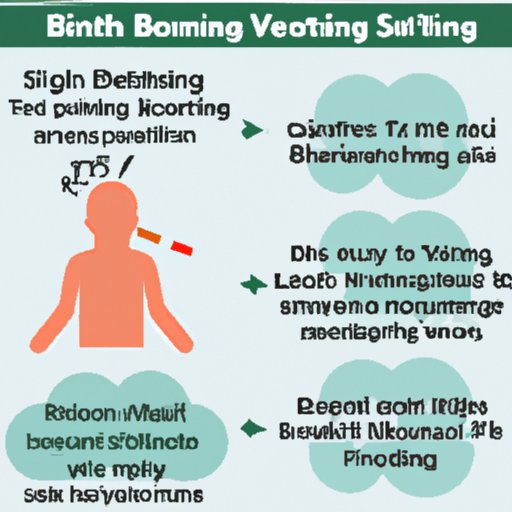
Introduction
Smoking is a hazardous habit that can cause long-term damage to your health. Millions of people smoke cigarettes every day, exposing themselves to a host of health problems ranging from lung cancer to heart disease. In this article, we explore what happens to your body when you quit smoking, including the benefits of quitting, the science behind it, the physical and psychological effects of quitting, and how to quit smoking successfully.

The Benefits of Quitting: How Your Body Heals After Quitting Smoking
If you’re a smoker, quitting can be one of the most important decisions you make for your health. Here are some of the benefits of quitting smoking:
Immediate benefits
Within 20 minutes of quitting smoking, your blood pressure and heart rate start to return to normal. After eight hours, the levels of carbon monoxide in your blood decrease, and the levels of oxygen increase, making it easier for you to breathe. After 48 hours, your sense of taste and smell improves, and your nerve endings begin to regenerate.
Short-term benefits
The short-term benefits of quitting smoking include a reduced risk of heart attack and stroke, improved circulation, and lower levels of stress. Quitting smoking for just a year can reduce the risk of heart disease by half compared to those who continue to smoke.
Long-term benefits
The long-term benefits of quitting smoking include a reduced risk of lung cancer, chronic lung conditions like emphysema and chronic bronchitis, and heart disease. Quitting smoking for 10 years reduces the risk of lung cancer by 50%, compared to those who continue to smoke.
The Science Behind Quitting: A Look at the Positive Changes in Your Body When You Quit Smoking
The impact of chemicals in tobacco smoke
Tobacco smoke contains over 7000 chemicals, many of which are toxic and can cause cancer. When you inhale tobacco smoke, these chemicals enter your bloodstream, make their way to your organs, and cause damage to your body.
Cellular level changes
When you quit smoking, your body starts to repair itself. Tiny hair-like structures in your lungs called cilia, which help clear mucus and bacteria, start to function again. The excess mucus and stuck particles in your lungs start to clear, making it easier for you to breathe. Damaged lung tissues also start to heal, with inflammation and scarring slowly disappearing.
Hormonal changes
The chemicals in tobacco smoke can cause harmful changes to your hormonal system. When you quit smoking, your body starts to recover from these changes, leading to a decrease in cortisol levels, which in turn reduces your stress levels. Your body also starts to produce less adrenaline, which can help reduce anxiety.
The Withdrawal Timeline: What to Expect When You Quit Smoking
Withdrawal symptoms can vary from person to person, and the timeline can be different for everyone. Here’s what you can expect:
First 24 hours
Withdrawal symptoms usually begin within the first 24 hours of quitting smoking. You may experience irritability, headaches, and cravings.
First week
During the first week, you may experience more intense cravings, anxiety, and depression. You may also experience physical symptoms like nausea, sore throat, and coughing as your body begins to heal.
First month
After a month of quitting smoking, you should start to notice significant improvements in your health. You may experience less brain fog, better lung function, and improved sense of taste and smell. However, you may still experience occasional cravings and mood swings.
Long-term withdrawal symptoms
Long-term withdrawal symptoms may include difficulty sleeping, weight gain, and anxiety. These can last for months or even years after quitting smoking.
The Psychological Effects of Quitting Smoking: How Your Brain Reacts
Nicotine addiction and withdrawal
Nicotine is a highly addictive substance found in tobacco, and quitting smoking can lead to withdrawal symptoms like irritability, anxiety, and depression. These symptoms can make quitting smoking challenging, but they usually go away after a few weeks.
Mood changes
Quitting smoking can also lead to changes in your mood. You may experience feelings of sadness, frustration, or anger as your brain adjusts to the absence of nicotine. However, these feelings usually go away after a few weeks, and you’ll start to feel more positive as you experience the benefits of quitting smoking.
Psychological strategies to cope with withdrawal
There are several strategies that can help you cope with nicotine withdrawal and stay on track with quitting smoking. These include setting realistic goals, finding healthy ways to relieve stress, and seeking support from friends and family.
The Physical Effects of Quitting: Improved Lung Function and Healthier Skin
Improved lung function
Smoking damages your lung function and can cause chronic lung conditions like emphysema and chronic bronchitis. When you quit smoking, your lung function begins to improve, and you may experience improved breathing, fewer coughing spells, and reduced risk of infection.
Healthier skin
Smoking can also cause damage to your skin, leading to premature aging, wrinkles, and skin discoloration. When you quit smoking, your skin starts to repair itself, leading to a healthier, more youthful appearance.
Other physical benefits
Quitting smoking can also lead to other physical benefits, including a lower risk of heart disease, improved fertility, and better overall health.
How to Quit Smoking Successfully: Tips and Tricks to Make the Transition Easier
Set a quit date
Setting a quit date can help you stay motivated and focused on your goal of quitting smoking. Choose a date that’s within two weeks, and prepare yourself mentally to face withdrawal symptoms.
Deal with triggers and cravings
Triggers and cravings can be powerful impediments to quitting smoking. Identify your triggers, such as social situations or stress, and develop strategies to deal with them. Try to avoid situations that trigger cravings and keep yourself occupied with activities that don’t involve smoking.
Seek support from friends and family
Having a support system can make all the difference when you’re trying to quit smoking. Reach out to friends and family and seek support from online communities or quit smoking hotlines.
The Long-Term Benefits of Quitting: Reducing Your Risk for Cancer, Heart Disease, and Chronic Lung Conditions
Reduced risk of cancer
Quitting smoking can significantly reduce your risk of developing cancer, especially lung cancer. Even if you’ve been smoking for years, quitting can reduce your risk of developing cancer-related diseases.
Reduced risk of heart disease
Smoking is one of the leading causes of heart disease. Quitting smoking can help reduce your risk of developing heart disease and can lead to a healthier, longer life.
Reduced risk of chronic lung conditions
Chronic lung conditions like emphysema and chronic bronchitis are common in smokers. Quitting smoking can help reduce your risk of developing these conditions and can lead to better lung function.
Conclusion
Quitting smoking is one of the most important things you can do for your health. The benefits of quitting smoking are numerous, including improved physical and psychological health, reduced risk of cancer, heart disease, and chronic lung conditions. While quitting smoking can be challenging, developing strategies to cope with withdrawal symptoms and seeking support from friends and family can help you overcome the addiction. Overall, quitting smoking can lead to a healthier, happier life.
Resources for quitting smoking:
- National Cancer Institute Quitline: 1-877-44U-QUIT (1-877-448-7848)
- Smokefree.




